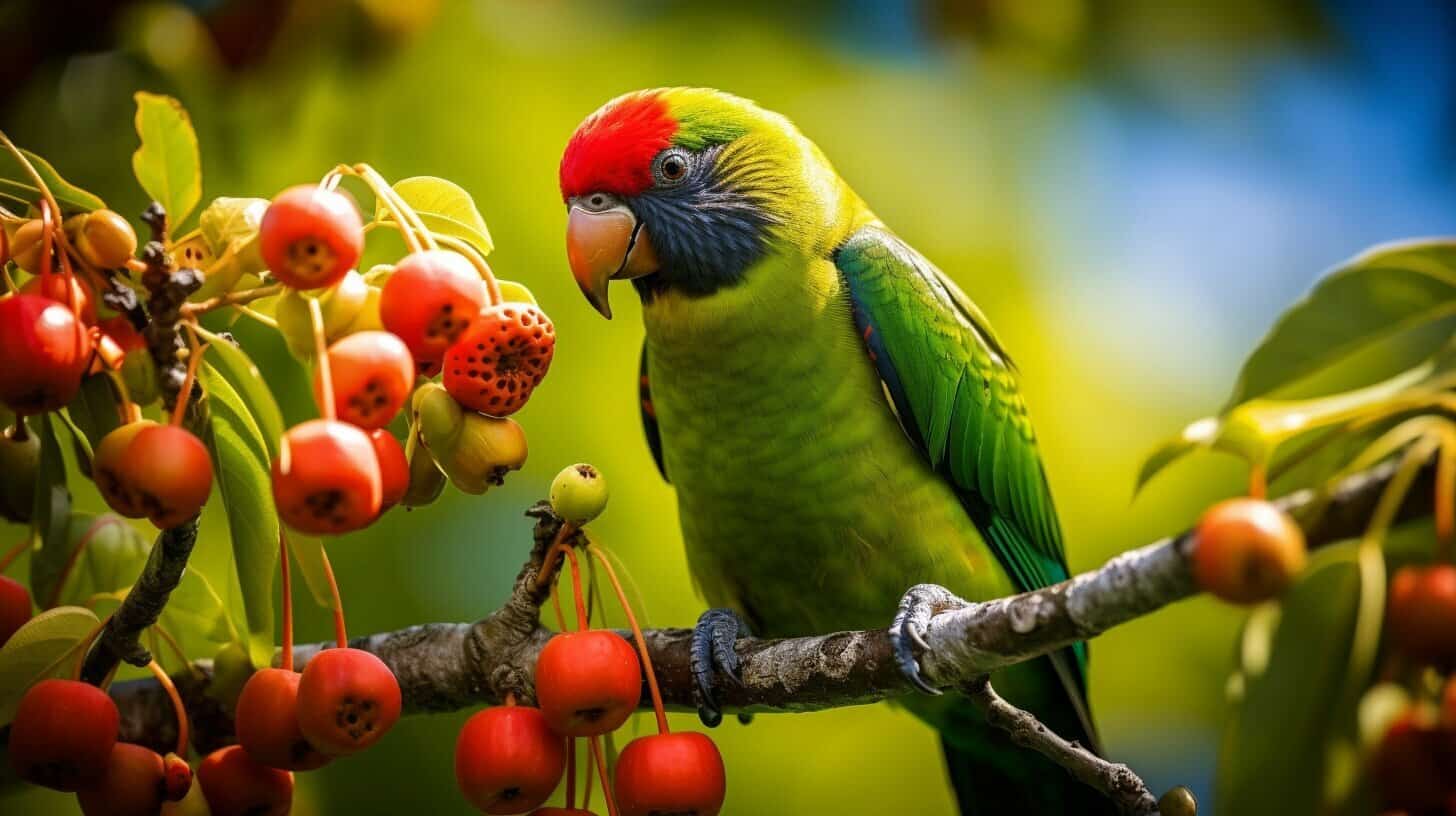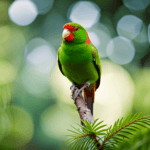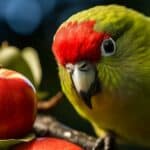Welcome to our comprehensive guide exploring whether Kakarikis can safely consume kiwi fruit. As a pet bird lover, you understand the importance of providing your feathered friend with a balanced diet that meets their nutritional needs. It’s essential to understand your bird’s dietary preferences to promote their optimal health and well-being.
Can Kakarikis eat kiwi fruit? Yes, Kakarikis can eat kiwi fruit. Kiwi is a good source of vitamins and safe for these birds. It should, however, only be a part of a varied diet. Always remove seeds before feeding as they can be harmful.
The question of whether Kakarikis can eat kiwi fruit is a common one amongst bird owners. In this article, we’ll explore the nutritional value of kiwi fruit for Kakarikis, their natural dietary preferences, and any potential risks or concerns associated with feeding them kiwi fruit. We’ll also provide you with practical guidelines on how to gradually introduce kiwi fruit into your Kakariki’s diet and other fruits and foods you can include to maintain a well-rounded diet.
Feeding Kiwi Fruit to Kakarikis: Things to Consider
Kiwi fruit, also known as Chinese gooseberry, is a delicious and nutritious fruit that many of us love to eat. But can our feathered friends, the Kakarikis, also enjoy this fruit as part of their diet? Let’s take a closer look at the nutritional value of kiwi fruit for Kakarikis and explore some important considerations before adding it to their diet.
| Nutritional Value of Kiwi Fruit |
|---|
| Vitamin C: Kiwi fruit is a great source of vitamin C, which is essential for birds as they cannot produce this vitamin on their own. It helps boost their immune system and promotes healthy skin and feathers. |
| Other Nutrients: Kiwi fruit also contains other beneficial nutrients such as vitamin K, vitamin E, potassium, and dietary fibre. |
While kiwi fruit is a nutritious food that can provide health benefits to Kakarikis, it’s important to remember that moderation is key. Introducing new foods into a bird’s diet should be done gradually and in moderation to avoid any digestive upsets or health issues.
Feeding Kiwi Fruit to Kakarikis: Things to Consider
“As with any new food, it’s important to monitor your bird for any signs of adverse reactions such as vomiting, diarrhea or lack of appetite. When feeding kiwi fruit to Kakarikis, it’s recommended to remove the skin and seeds, and offer it in small amounts as a treat alongside their regular diet.”
It’s also important to keep in mind the natural diet of Kakarikis when introducing new foods into their diet. These birds primarily feed on fruits, berries, seeds, and insects in the wild. Replicating their natural diet as closely as possible provides a well-rounded diet that meets their nutritional needs.
Next, we’ll take a closer look at the natural diet of Kakarikis and how it can inform their diet in captivity.
Kakariki Food Preferences: Understanding Their Natural Diet
As with any animal, understanding the natural diet of a Kakariki is crucial to ensuring their optimal health and well-being. These birds are primarily herbivorous and their diet consists mainly of fruits, berries, seeds, and insects. In their natural habitat, Kakarikis are known to feed on a variety of plant species, including Kanuka, Manuka, and Rimu.
To ensure a healthy and balanced diet for captive Kakarikis, it’s essential to replicate their natural diet as closely as possible. This means providing a variety of fresh fruits, vegetables, and seeds on a regular basis. Kakarikis also require a source of protein in their diet, which can be provided through small amounts of cooked eggs or insects.
Are Kiwi Fruit and Kakarikis Compatible?
When it comes to feeding Kakarikis, it’s important to understand which fruits are safe and beneficial for their health. While kiwi fruit can be a nutritious addition to their diet, certain factors should be considered before offering it to your feathered friend.
So, can Kakarikis eat kiwi fruit?
The short answer is yes, but in moderation. Kiwi fruit contains high amounts of vitamin C, which is essential for a bird’s immune system. Additionally, it’s a good source of fibre, potassium, and other beneficial nutrients.
However, it’s crucial to remember that kiwi fruit should not be the only fruit in a Kakariki’s diet. While it can provide some nutritional benefits, it should be balanced with other fruits, vegetables, seeds, and insects to ensure a well-rounded diet. As with any new food, the introduction of kiwi fruit should be gradual and monitored for any adverse reaction.
What are the potential risks of feeding kiwi fruit to Kakarikis?
While kiwi fruit is generally considered safe for birds, there are a few precautions to keep in mind. Firstly, choosing ripe, organic kiwi fruit that has not been treated with pesticides or chemicals is important. Additionally, the skin and seeds of kiwi fruit can be tough and difficult to digest, so these should be removed before offering it to your Kakariki.
What are the best fruits for Kakarikis?
Aside from kiwi fruit, several other fruits are safe and beneficial for Kakarikis. These include apples, bananas, berries, melons, and citrus fruits. It’s important to offer a variety of fruits to ensure all nutritional requirements are met. Like kiwi fruit, these should be introduced gradually and balanced with other food groups.
Kiwi fruit can be a nutritious addition to a Kakariki’s diet when offered in moderation. By understanding their natural dietary preferences and nutritional needs, you can provide a balanced diet that promotes their overall health and well-being.
Introducing Kiwi Fruit Into Your Kakariki’s Diet
When introducing kiwi fruit into your Kakariki’s diet, it is important to do so gradually to avoid upsetting their digestive system. Begin by offering small amounts of ripe, organic kiwi fruit.
Monitor your bird for any adverse reactions, such as digestive issues or changes in behaviour. If your Kakariki responds well, gradually increase the amount of kiwi fruit in their diet.
The recommended serving size for kiwi fruit is approximately one teaspoon per day. It is important to balance this with other fruits and food groups to meet your Kakariki’s nutritional needs.
Note: Always remove any seeds or skin from the kiwi fruit before offering it to your bird, as these can pose a choking hazard.
The Benefits of Kiwi Fruit for Kakarikis
Kiwi fruit is a nutrient-packed fruit that can provide various benefits to Kakarikis when included in their diet. Here are some of the specific benefits of kiwi fruit:
| Benefit | Description |
|---|---|
| Vitamin C | Kiwi fruit is an excellent source of vitamin C, which can help boost a Kakariki’s immune system and promote overall health. |
| Antioxidants | Kiwi fruit contains antioxidants that can protect cells from damage caused by free radicals and reduce the risk of certain diseases. |
| Digestive Health | Kiwi fruit also contains enzymes that can help improve digestion and reduce inflammation in the digestive system. |
It’s important to remember that while kiwi fruit can provide many benefits, it should be included as part of a balanced diet and not as the sole food source for Kakarikis. Offering a variety of fruits, vegetables, seeds, and grains can help ensure they receive all the necessary nutrients for optimal health.
Remember to moderate kiwi fruit and monitor your Kakariki for any adverse reactions such as allergies or digestive issues.
Potential Risks and Precautions
While kiwi fruit can be a nutritious addition to a Kakariki’s diet, there are some potential risks and precautions to consider before feeding it to your bird.
Firstly, it is important to choose ripe, organic kiwi fruits. Avoid feeding fruits that are overly ripe, as they may contain mould or bacteria. It is also important to remove the skin and seeds of the fruit before offering it to your bird, as these can be a choking hazard and may contain trace amounts of cyanide.
Additionally, while kiwi fruit is high in vitamin C and other beneficial nutrients, it can also be high in sugar. As with all new foods, it is important to introduce kiwi fruit gradually and in moderation. Overfeeding kiwi fruit or introducing it too quickly into a bird’s diet can lead to gastrointestinal upset, such as diarrhoea.
If you notice any adverse reactions in your Kakariki after introducing kiwi fruit, such as lethargy, loss of appetite, or changes in their droppings, it is important to consult with a veterinarian immediately. These symptoms may indicate a larger health issue that requires medical attention.
By following these precautions and introducing kiwi fruit in moderation, you can safely incorporate this nutritious fruit into your Kakariki’s diet.
Other Fruits to Include in a Kakariki’s Diet
In addition to kiwi fruit, several other fruits can be included in a Kakariki’s diet. Here are some safe and beneficial options:
| Fruit | Nutritional Value |
|---|---|
| Apples | Rich in vitamin C and fibre |
| Bananas | Good source of potassium and vitamin B6 |
| Berries | High in antioxidants and vitamin C |
It’s important to offer your Kakariki a variety of fruits to ensure a well-rounded diet. Consider rotating different fruits to keep things interesting for your bird.
Balancing a Kakariki’s Diet: Considerations and Recommendations
While kiwi fruit can be a nutritious addition to a Kakariki’s diet, ensuring their overall diet is balanced and meets their nutritional requirements is important. Here are some considerations and recommendations to keep in mind:
| Food Group | Recommended Amount |
|---|---|
| Fruits and Berries | 1-2 servings per day |
| Seeds and Grains | 1-2 tablespoons per day |
| Vegetables | 1-2 servings per week |
| Insects and Proteins | 1-2 servings per week |
It’s important to offer a variety of fruits and berries, such as apples, bananas, and berries, to ensure your Kakariki receives a range of nutrients. When introducing a new food into their diet, do so gradually and monitor for any adverse reactions such as vomiting or diarrhoea.
Seeds and grains provide important fats and protein, so it’s essential to ensure they consume an appropriate amount each day. Similarly, vegetables provide beneficial vitamins and minerals, so a small weekly serving can promote overall health. Insects and proteins such as boiled egg or mealworms can also be provided on occasion to supplement their diet.
It’s important to note that a Kakariki’s diet may vary depending on their age, activity level, and health status. Consulting with an avian veterinarian or bird nutritionist can help ensure your pet receives a well-balanced diet tailored to their needs.
Common Misconceptions About Kakarikis and Kiwi Fruit
Despite the growing awareness of the importance of a balanced diet for pet birds, many misconceptions exist about what they can and cannot eat. Here are some of the most common misconceptions surrounding the topic of Kakarikis and kiwi fruit:
- Misconception: Kakarikis should not eat fruit.
- Facts: Fruit can actually be an important part of a Kakariki’s diet, as they naturally consume various fruits in the wild. However, it’s important to offer fruit in moderation and balance it with other essential nutrients.
- Misconception: Kiwi fruit is toxic to Kakarikis.
- Facts: Kiwi fruit is not toxic to Kakarikis when offered in moderation and prepared correctly. However, as with any new food, it’s important to monitor your bird for any adverse reactions and introduce it gradually.
- Misconception: Kakarikis can eat any type of fruit.
- Facts: Not all fruits are safe or beneficial for Kakarikis. It’s important to research and understand the nutritional content of each fruit before offering it to your bird.
- Misconception: Kiwi fruit is the only fruit that Kakarikis need.
- Facts: While kiwi fruit can be a nutritious and delicious addition to a Kakariki’s diet, it should not be the only fruit offered. It’s important to provide a variety of fruits and rotate them regularly to ensure a well-rounded diet.
“It’s essential to educate yourself on the dietary needs of your Kakariki and provide a balanced and varied diet to promote their overall health and well-being.”
Frequently Asked Questions About Feeding Kiwi Fruit to Kakarikis
As a pet bird owner, having questions about what foods you can and cannot feed your Kakariki is natural. Here are some frequently asked questions about feeding kiwi fruit to your Kakariki:
Can Kakarikis eat kiwi fruit?
Yes, Kakarikis can eat kiwi fruit in moderation as long as it is offered in ripe, organic form and the skin and seeds are removed. Kiwi fruit is rich in vitamin C, which can boost their immune system and digestion. However, it should not replace their regular diet and should only be given as an occasional treat.
How much kiwi fruit can I feed my Kakariki?
Limiting the amount of kiwi fruit to no more than a few small pieces per week is recommended. Feeding too much can upset their digestive system and cause health problems.
Are there any risks associated with feeding kiwi fruit to Kakarikis?
Feeding too much kiwi fruit can cause digestive issues such as diarrhea, so it is important to offer it in moderation. Additionally, some Kakarikis may have allergies to kiwi fruit, so monitoring their reaction after introducing it to their diet is recommended.
What are some other fruits that Kakarikis can eat?
Other safe fruits for Kakarikis include apples, bananas, berries, melons, and grapes. It is important to remember that any new food introduced should be done gradually and in small amounts to prevent upsetting their digestive system.
Can feeding kiwi fruit to my Kakariki replace their regular diet?
No, kiwi fruit should only be offered as an occasional treat and should not replace their regular diet. Kakarikis require a balanced diet that includes a variety of fruits, vegetables, seeds, and grains to meet their nutritional needs.
What are some signs that my Kakariki is having a negative reaction to kiwi fruit?
Some signs of a negative reaction to kiwi fruit can include vomiting, diarrhea, or lethargy. If you notice any of these signs, discontinue feeding kiwi fruit and consult with a veterinarian.
Can I feed my Kakariki frozen or canned kiwi fruit?
No, feeding your Kakariki frozen or canned kiwi fruit is not recommended. Fresh, ripe, organic kiwi fruit is the best option and provides the most nutritional benefits.
Is it necessary to rotate different fruits in my Kakariki’s diet?
Yes, offering a variety of fruits is important to ensure a well-rounded diet. Rotating different fruits can prevent boredom and ensure your Kakariki is receiving all of the necessary vitamins and nutrients.



Have comments or questions about this article? Then get involved!
Spotted an error or something we have missed? Let us know